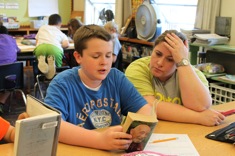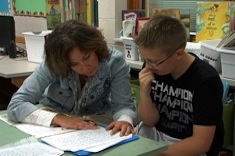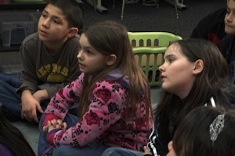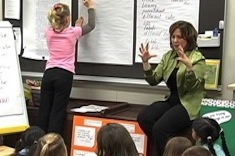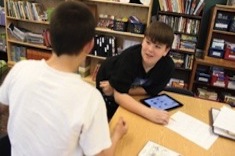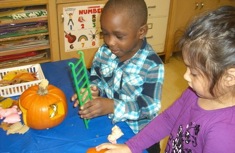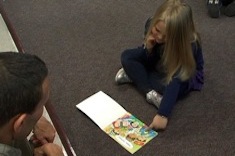Articles
Here is where you’ll find all the latest print features from our contributors. If you’d like to browse specifically by grade level, topic, or contributor, you can use the links in the right sidebar.
Latest Content
Mock Newbery Club
Katherine Sokolowski has suggestions for organizing and hosting a Mock Newbery Club in the weeks before the award is given in late January.
Exploring Winter with Short Texts
Middle school teachers Megan Ginther and Holly Mueller focus on winter in short texts as the theme of their December Literacy Contracts in the latest installment of their year-long series.
Curating a Nonfiction Classroom Library
Franki Sibberson writes about how her thinking about nonfiction is changing her classroom library in this first installment of a four-part series.
Better Reading Conferences
Katherine Sokolowski describes how she worked over the past few years to initiate better reading conferences.
Powerful Conferences
Ruth Ayres explains how deciding the purpose of conferring in advance can lead to more powerful conferences.
November Contract: Family and Memoir
The November installment of Megan Ginther and Holly Mueller’s yearlong literacy contract series has a theme of family and memoir.
Shared Blogging in the Primary Classroom
Shared reading and shared writing are essential instructional techniques in the primary grades. How about shared blogging for teaching children basic blogging skills? Cathy Mere describes how it works.
Dandelions, Chinese, and Patience with Our Youngest Learners
Kelly Petrin meditates on the importance of trust and patience when looking for ways to connect with preschoolers.
Finding a Writing Buddy
Beth Lawson helps her fourth graders sort through what makes peer collaboration work during writing buddy time.
Two Lessons for Teaching Theme
Franki Sibberson writes about how she chooses books for theme instruction and shares two lessons.
Learning from Kidwatching
Quiet kindergartners can be a challenge to understand when they are in the beginning stages of learning social and academic norms. Andie Cunningham uses observation to make sense of five-year-old Sierra’s learning.
Choice, Content, and Format: Understanding How Boys Write
Katherine Sokolowski is dismayed when many of the boys in her fifth-grade class admit they don’t like to write. She explains how she changed her writing program to meet their needs.
She Wants to Be Katniss for Halloween: Courageous Girls in Books
Shari Frost celebrates a tomboy who finally finds a female character she wants to emulate with a booklist highlighting courageous girls.
Pumpkin Time: Provocations and Stories with Preschoolers
Kelly Petrin reinvents a pumpkin decorating project with her preschoolers to help them build storytelling skills.
Exploring Explanatory Moves Writers Use
Jeff Anderson explores the difference between informational and explanatory writing, and what that might mean for teaching craft moves to students.
Research Book Clubs for Struggling Readers
Beth Lawson finds that a nonfiction research book club is just the grouping structure needed for a group of struggling readers in her fourth-grade classroom.
Your Opinion Matters—Really
Gretchen Schroeder guides us in getting feedback from students, as well as sharing with students the way their feedback matters to us. In a world where we are constantly asked to fill out feedback forms, it’s good to know when our opinions matter.
Mentor Texts for “Versus” Stories
Shark vs. Train! Fork vs. Spoon! Versus stories are incredibly popular in writing workshops these days. Cathy Mere found herself struggling to teach narrative conventions to students writing versus tales, so she created a booklist of mentor texts.
On the Same Team: Better Parent-Teacher Conferences
Katherine Sokolowski has tips for improving parent conferences by using technology for flexible scheduling and easy follow-up.
The Art of the Book Talk
If you want to match students to books, you’ll need to master the art of the book talk. Katherine Sokolowski has practical tips for honing your skills.
Creating Your Own Kindergarten Assessment
Max Brand finds standard assessments don’t always give him the information he needs when working with kindergarten English language learners, so he develops his own tool for analyzing book handling skills.
Teaching the Genes
Suzy Kaback rethinks the concept of "managed choice" in writing workshops.
Why Write?
Ruth Ayres answers the question of why writing matters for busy teachers who struggle to find time for their own writing notebooks.
October Literacy Contracts: Fear and Conflict
Megan Ginther and Holly Mueller continue their monthly series on using literacy contracts in middle school. The October literacy contracts have a theme of fear and conflict.
Chris Lehman on Student Research (PODCAST)
Franki Sibberson chats with Chris Lehman (author of Energize Research Reading and Writing) about how the Common Core is changing the ways teachers approach student research in their classrooms.
“We Gather Together”: On Research and Weddings
Ruth Ayres and her colleagues use a marriage analogy to help middle school students and their families understand the research process. The article includes a nifty example of a pamphlet to share with parents.
Limiting and Extending Choice in Student Research Projects
When students are able to pick any research topic, they often will choose something they have already studied extensively. How can teachers allow students to pick topics for research they care passionately about and at the same time ensure there is the potential for rich inquiry? Maria Caplin describes the process she uses in her fifth-grade classroom to help students find and refine research topics for deeper learning.
Keeping Kids Safe on the Internet
Julie Johnson provides helpful tips and a letter for parents to help keep students safe on the Internet.
Finding the “Ex” Factor in Explanatory Writing
Jeff Anderson launches a new series on explanatory writing, a topic of high interest to teachers now because of the Common Core.
Kidwatching and Connections in the Early Days
Cathy Mere finds the early days of school are all about kidwatching and connecting with her first-grade students during reading and writing workshops. She shares some terrific guiding questions that might also help new teachers hone their observation skills.
Browse Content By
Type
Category
- Assessment Tools
- Big Fresh Archives
- Booklists
- Choice Numeracy
- Classroom Design
- Common Core
- Community Building
- Conferring
- Content Literacy
- Digital Literacy
- English Language Learners
- Equity
- Family Relations
- Free Samples
- Guiding Groups
- Leadership
- Literacy Coaches
- Mentor Texts
- Minilessons
- New Teacher Mentors
- Podcasts
- Poetry
- Quote Collections
- Reading Strategies
- Self Care
- Struggling and Striving Learners
- Talking and Listening
- Teacher Study Groups
- Teaching Reading
- Teaching Writing
- Word Study and Vocabulary
Author
- Melissa Quimby
- Nawal Qarooni
- Gwen Blumberg
- Julie Cox
- The Lead Learners
- Hannah Tills
- Josie Stewart
- Ruth Metcalfe
- Mallory Messenger
- Becca Burk
- Jodie Bailey
- Vivian Chen
- Mary Brower
- Tiffany Abbott Fuller
- Stephanie Affinito
- Ruth Ayres
- Leigh Anne Eck
- Heather Fisher
- Shari Frost
- Julie Johnson
- Suzy Kaback
- Gigi McAllister
- Shirl McPhillips
- Melanie Meehan
- Cathy Mere
- Debbie Miller
- Tara Barnett and Kate Mills
- Tammy Mulligan
- Dana Murphy
- Bitsy Parks
- David Pittman
- Brenda Power
- Heather Rader
- Matt Renwick
- Mandy Robek
- Christy Rush-Levine
- Gretchen Schroeder
- Jen Schwanke
- Brian Sepe
- Katherine Sokolowski
- Stella Villalba
- Jennifer Vincent
Grade Level
Choice Literacy Membership
Articles
Get full access to all Choice Literacy article content
Videos
Get full access to all Choice Literacy video content
Courses
Access Choice Literacy course curriculum and training




